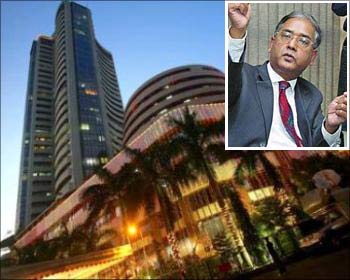Photographs: Reuters
Heralding a new set of rules for takeover of companies, the Securities and Exchange Board of India board on Thursday said that an entity buying 25 per cent stake in a listed firm will have to mandatorily make an offer to buy additional 26 per cent from public shareholders.
The new norms mark an increase in the open offer size for public shareholders from 20 per cent currently, while the trigger for such offer has also been raised from 15 per cent in the existing regulations.
Partly accepting the recommendations of a Sebi-appointed panel on the matter, Sebi also decided to abolish the non-compete fees that acquirers generally pay to the sellers in merger and acquisition deals.
The decisions were taken at a Sebi board meeting in Mumbai on Thursday and were later announced by Sebi chairman U K Sinha.
. . .
NEW takeover code! Minimum open offer size at 26%
Image: The Sebi building in Mumbai.The Sebi panel on new takeover regulations had recommended an open offer for buying up to 100 per cent in the target company, while suggesting an increase in the trigger limit to 25 per cent.
While the recommendation on trigger has been accepted, the same for offer size has been kept lower due to intense opposition from industry and other market participants.
At the time of recommendation of Achutan committee, it was said that all the public shareholders were required to be given an exit opportunity in case of promoters of target company selling out their stake to acquirers.
For removal of non-compete fees, which could be as high as 25 per cent of deal value, the logic was given that promoters should not get higher price than that for public shareholders.
. . .
NEW takeover code! Minimum open offer size at 26%
Photographs: Reuters
Commenting on the Sebi decision, consultancy firm Corporate Professionals managing director Pavan Kumar Vijay said: "The Sebi board approved new Takeover Regulations. It's a good move in the direction of simplification of the complicated law."
He said the move to raise open offer trigger point from 15 per cent to 25 per cent was a "good move for increasing fund raising options and joint ventures".
It has been said that institutional investors were not being able to put money in listed companies in excess of 15 per cent in fear of mandatory requirement of additional 20 per cent open offer. Now, the investors can buy up to 25 per cent stake without making an open offer.
Vijay said Sebi has decided to increase open offer size to only 26 per cent due to "industry pressure against the 100 per cent offer size recommendation of Achutan Committee".
. . .
NEW takeover code! Minimum open offer size at 26%
Photographs: Rediff Archive
"Though logic of 26 per cent is not known, but the move is good for domestic promoters and industry as cost concerns and funding of offer is addressed to a major extent," he added.
On non-compete fee, he said that Sebi has accepted the TRAC recommendation of scrapping the non-compete fee.
"Outright scrapping may not be treated as a right move as Promoters can not be treated as right in all cases. Where the promoters have real personal contribution in business, Non-compete fee is logical," he added.
Now shorter and simpler IPO form, says Sebi
The Sebi also decided to introduce a new short and simple form for IPO investors for increasing retail participation in the stock markets.
"The present IPO form is not investor friendly. It takes a lot of time to understand it. Taking all this into account, the whole form has been changed and this will lead to reduction in the size of the form by about one-fourth," Sebi chairman U K Sinha said in Mumbai.
Talking to reporters after the Sebi board meeting, he said the aim is to make the form simple and understandable for ordinary retail investor.
The board also decided that the form would also carry information regarding the peer companies' price-earnings (PE) ratio and track record of lead managers of the IPO.
The application forms currently being used for bidding in initial public offers and follow-on public offers are long and require the investors to fill in some details that can be done away with.
Besides, these forms run into 15-20 pages in most cases, although there are only 2-3 pages where particulars need to be filled in by the investors.
The rest of the pages contain instructions, information about the company and the issue and details about bankers, registrars and bidding centres.
The Sebi Board also decided on a uniform KYC (know-your- customer) norms for different market players and accept 'Aadhar' or Unique Identity card as one of the document as identity proof for bidding in IPO and FPO.
Currently, there are separate KYC norms for different segments, like FIIs, mutual funds and brokerage customers.
The idea behind uniform KYC norms is to ensure seamless identification of customers in the securities market.
With an aim to increase retail participation in the markets, the board also decided to open new regional offices in Lucknow, Hyderabad and Guwahati, besides strengthening the existing offices.
"Hopefully these (new) offices will become operational soon," Sinha said.
He said that the idea behind strengthening regional offices is that "Sebi should reach" small investors.
The board also decided that henceforth merchant bankers will have to ensure that they maintain proper records of due diligence or their track record.
. . .
NEW takeover code! Minimum open offer size at 26%
Photographs: Uttam Ghosh/Rediff.com
Sebi to frame regulation for alternative investments
In order to safeguard investors from falling prey to dubious schemes of portfolio managers, capital market regulator Sebi will soon come out with guidelines for alternative investments.
The issue was discussed at the Sebi board meeting, after which Chairman U K Sinha announced that the regulator will soon frame rules to govern alternative
investments and portfolio wealth managers.
Although Sinha did not disclose the areas that will be included under the new regulation, alternative investment schemes generally cover art works, antiques, coins and stamps, as well as a host of other instruments besides popular avenues like stocks, commodities and derivatives.
The new rules would also apply to an estimated $1 trillion wealth management industry.
As part of the proposed regulatory framework for alternative investments, Sebi is already planning to set up an intermediary regulatory body with representation from among the wealth managers themselves.
The new rules would cover entities offering wealth management or investment advisory services across various asset classes irrespective of the different financial markets.
These would include stocks, commodities, fixed deposits, derivatives, insurance, mutual funds, private equity, pension funds as also alternative investment products such as funds investing in art works, antiques, coins and stamps.
For past few months, Sebi has been in consultation with the government, RBI and other financial regulators for framing a new set of rules for the wealth managers.
Given the size of the industry, and therefore a higher risk of large-scale frauds or manipulations, the new rules would also allow Sebi and RBI to impose strict penalties.
Although there are no official figures for it, the size of wealth management industry is pegged at about $1 trillion -- nearly double the size a couple of years ago.
While RBI and Sebi would be primarily responsible for compliance of the rules, help would be sought from other regulators, namely commodity regulator FMC, insurance watchdog IRDA and pension fund regulator PFRDA, whenever needed.
Sources said that Sebi also aims to frame a stringent set of rules for funds investing in art works, antiques, coins and stamps, with an aim to check black money flow into these products and safeguard the interest of genuine investors.
Sebi considers investment funds focused on art works, antiques, coins and stamps as "Collective Investment Schemes", which come under the ambit of the capital market regulator.
Fearing flow of illicit wealth into these funds and also a high level of risk posed by them to the general investors, Sebi is now considering framing a specific set of regulations for these funds.
. . .
NEW takeover code! Minimum open offer size at 26%
Photographs: Reuters
MF investors will have to pay extra fee per transaction
The Sebi has reintroduced entry load in mutual funds. A transaction charge of Rs 100 will be levied on existing mutual fund folios.
The regulator has also decided to levy transaction charge of Rs 150 on new mutual fund folios. Sinha said the charge would incentivise the distributors.
However, there would be no transaction fee on investments worth Rs 10,000 or less in mutual funds.







article